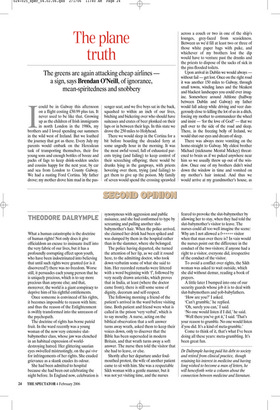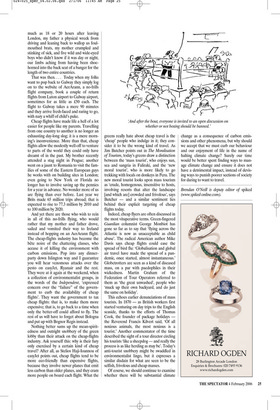The plane truth
The greens are again attacking cheap airlines — a sign, says Brendan O’Neill, of ignorance, mean-spiritedness and snobbery Icould be in Galway this afternoon on a flight costing £50.99 plus tax. It never used to be like that. Growing up as the children of Irish immigrants in north London in the 1980s, my brothers and I loved spending our summers in the wild west of Ireland. But we loathed the journey that got us there. Every July my parents would embark on the Herculean task of transporting themselves, their five young sons and enough bottles of booze and packs of fags to keep drink-sodden uncles and cousins happy for the next year, by car and sea from London to County Galway. We had a rusting Ford Cortina. My father drove; my mother drove him mad in the pas senger seat; and we five boys sat in the back, squashed to within an inch of our lives, bitching and bickering over who should have suitcases and crates of beer plonked on their laps or in between their legs. In this state we drove the 250 miles to Holyhead.
There we would sleep in the Cortina for a bit before boarding the dreaded ferry at some ungodly hour in the morning. It was the most awful vessel, full of exhausted parents trying (and failing) to keep control of their screeching offspring; there would be drunks lying in the gangways, with priests hovering over them, trying (and failing) to get them to give up the poison. My family of seven would spend the crossing sprawled across a couch or two in one of the ship’s lounges, grey-faced from seasickness. Between us we’d fill at least two or three of those white paper bags with puke, and whichever of my brothers lost the dip would have to venture past the drunks and the priests to dispose of the sacks of sick in the piss-flooded toilets.
Upon arrival in Dublin we would always without fail — get lost. Once on the right road it was another 150 miles to Galway, through small towns, winding lanes and the bleakest and blackest landscapes you could ever imagine. Somewhere around Athlone (halfway between Dublin and Galway) my father would fall asleep while driving and veer dangerously close to killing the lot of us in a ditch, forcing my mother to commandeer the wheel and insist — ‘for the love of God!’ — that we pull over to the side of the road and sleep. There, in the freezing belly of Ireland, we would shut our eyes and dream of sleep.
There was always more vomiting on the home-straight to Galway. My eldest brother Michael (nickname Mental Mickey) threatened to brain us if we puked anywhere near him so we usually threw up out of the window. Once one of my brothers didn’t wind down the window in time and vomited on my mother’s hair instead. And thus we would arrive at my grandmother’s house, as much as 18 or 20 hours after leaving London, my father a physical wreck from driving and leaning back to wallop us foulmouthed brats, my mother crumpled and stinking of sick, and five wild and wide-eyed boys who didn’t know if it was day or night, our limbs aching from having been shoehorned into the back seat of a banger for the length of two entire countries.
That was then.... Today when my folks want to pop back to Galway they simply log on to the website of AerArann, a no-frills flight company, book a couple of return flights from Luton airport to Galway airport, sometimes for as little as £50 each. The flight to Galway takes a mere 90 minutes and they arrive fresh-faced and raring to go, with nary a whiff of child’s puke.
Cheap flights have made life a hell of a lot easier for people like my parents. Travelling from one country to another is no longer an exhausting day-long slog; it is a mere morning’s inconvenience. More than that, cheap flights allow the modestly well-off to venture to parts of the world they could only have dreamt of in the past. My brother recently attended a stag night in Prague; another went on a jaunt to Romania to visit the families of some of the Eastern European guys he works with on building sites in London; even going to New York or Florida no longer has to involve saving up the pennies for a year in advance. No wonder more of us are flying than ever before. Last year we Brits made 65 million trips abroad; that is expected to rise to 77.3 million by 2010 and to 100 million by 2020.
And yet there are those who wish to rein in all of this no-frills flying, who would rather that my mother and father drove, sailed and vomited their way to Ireland instead of hopping on an AerArann flight. The cheap-flights industry has become the bête noire of the chattering classes, who accuse it of killing the environment with carbon emissions. Pop into any dinnerparty down Islington way and I guarantee you will hear venomous attacks over the pesto on easyJet, Ryanair and the rest. They were at it again at the weekend, when a collection of environmentalist groups, in the words of the Independent, ‘expressed concern over the “failure” of the government to curb the availability of cheap flights’. They want the government to tax cheap flights: that is, to make them more expensive; that is, to go back to a time when only the better-off could afford to fly. The rest of us will have to forget about Bologna and put up with Bognor Regis instead.
Nothing better sums up the mean-spiritedness and outright snobbery of the green lobby than their attack on the cheap-flights industry. Ask yourself this: why is their fury only exercised by a certain kind of cheap travel? After all, as Stelios Haji-Ioannou of easyJet points out, cheap flights tend to be more eco-friendly than expensive flights, because they involve newer planes that emit less carbon than older planes, and they cram more people on board each flight. What the greens really hate about cheap travel is the ‘cheap’ people who indulge in it; they consider it to be the wrong kind of travel. As Jim Butcher points out in The Moralisation of Tourism, today’s greens draw a distinction between the ‘mass tourist’, who enjoys sun, sea and sangria in Faliraki, and the ‘new moral tourist’, who is more likely to go trekking with locals on donkeys in Peru. The new moral tourist looks upon mass tourism as ‘crude, homogenous, insensitive to hosts, involving resorts that alter the landscape [and which are] crowded and frivolous’, says Butcher — and a similar sentiment lies behind their explicit targeting of cheap flights today.
Indeed, cheap flyers are often discussed in the most vituperative terms. Green-fingered Guardian columnist George Monbiot has gone so far as to say that ‘flying across the Atlantic is now as unacceptable as child abuse’. The radical American author Mike Davis says cheap flights could ease the spread of bird flu: ‘Globalisation and global air travel have made the spread of a pandemic, once started, almost instantaneous.’ Globetrotters are seen as a kind of diseased mass, on a par with paedophiles in their wickedness. Martin Graham of the Federation of Tour Operators referred to them as ‘the great unwashed’, people who ‘muck up their own backyard, and do just the same on holiday’.
This echoes earlier denunciations of mass tourists. In 1870 — as British workers first started venturing on day trips to the English seaside, thanks to the efforts of Thomas Cook, the founder of package holidays the Reverend Francis Kilvert said, ‘Of all noxious animals, the most noxious is a tourist.’ Another commentator of the time described the sight of a tour director circling his tourists ‘like a sheepdog — and really the process is as like herding as may be’. Today’s anti-tourist snobbery might be swaddled in environmentalist lingo, but it expresses a similar disdain for what are seen to be the selfish, frivolous and cheap masses.
Of course, we should continue to examine whether there will be substantial climate change as a consequence of carbon emissions and other phenomena, but why should we accept that we must curb our behaviour and our enjoyment of life in the name of halting climate change? Surely our time would be better spent finding ways to manage climate change and ensure it does not have a detrimental impact, instead of devising ways to punish poorer sections of society for daring to want to travel.
Brendan O’Neill is deputy editor of spiked (www.spiked-online.com).






























































































































 Previous page
Previous page